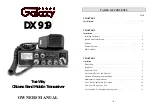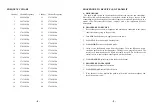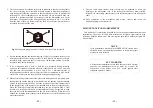
- 12 -
5. The wires must now be soldered to the pins as indicated in the above wiring tables.
If a vise or clamping tool is available it should be used to hold the pin receptacle
body during the soldering operation, so that both hands are free to perform the
soldering. If a vise or clamping tool is not available, the pin receptacle body can
be held in a stationary position by inserting it into the microphone jack on the
front panel. The numbers of the microphone plug are shown in Fig. 3, as viewed
from the back of the plug. Before soldering the wire to the pins, pre-tin the wire
receptacle of each pin of the plug.
Fig. 3
Microphone plug pin numbers viewed from rear of pin receptacle.
6. Be sure that the housing and the knurled ring of Figure 2 are pushed back onto the
microphone cable before starting to solder. If the washer is not captive to the pin
receptacle body, make sure that it is placed on the threaded portion of the pin
receptacle body before soldering.
7. If the microphone jack is used to hold the pin receptacle during soldering
operation, best results are obtained when the connections to pin 1 and 3 are made
first and then the connections to pins 2 and 4. Use a minimum amount of
soldering and be careful to prevent excessive solder accumulation on pins, which
could cause a short between the pin and the microphone plug housing.
8. When all soldering connections to the pins of the microphone are completed, push
the knurled ring and the housing forward and screw the housing onto the threaded
portion of the pin receptacle body. Note the location of the screw clearance hole
in the plug housing with respect to the threaded hole in the pin receptacle body.
When the housing is completely threaded into the pin receptacle body, a final
fraction of a turn either clockwise or counterclockwise may be required to align
the screw hole with the threaded hole in the pin receptacle body. When these are
aligned, the retaining screw is then screwed into place to secure the housing to the
pin receptacle body.
- 13 -
9. The two cable clamp retainer screws should now be tightened to secure the
housing to the microphone cord. If the cutting directions have been carefully
followed, the cable clamp should secure to the insulation jacket of the microphone
cable.
10. Upon completion of the microphone plug wiring, connect and secure the
microphone plug in the transceiver.
MAINTENANCE AND ADJUSTMENT
This transceiver is specifically designed for the environment encountered in mobile
installations. The use of all solid state circuitry and its light weight result in high
reliability. Should a failure occur, however, replace parts only with identical parts. Do
not substitute.
NOTE
If the performance described in the OPERATION section is not
obtained, review the operating instructions to insure that proper
procedures were followed.
FCC WARNING
All transmitter adjustments other than those provided on front
panel by the manufacturer must be made by or under the
supervision of the holder of an FCC issued general radio
telephone operator’s license.
Summary of Contents for DX 919
Page 9: ...MEMO MEMO...
Page 10: ...MEMO MEMO...





























